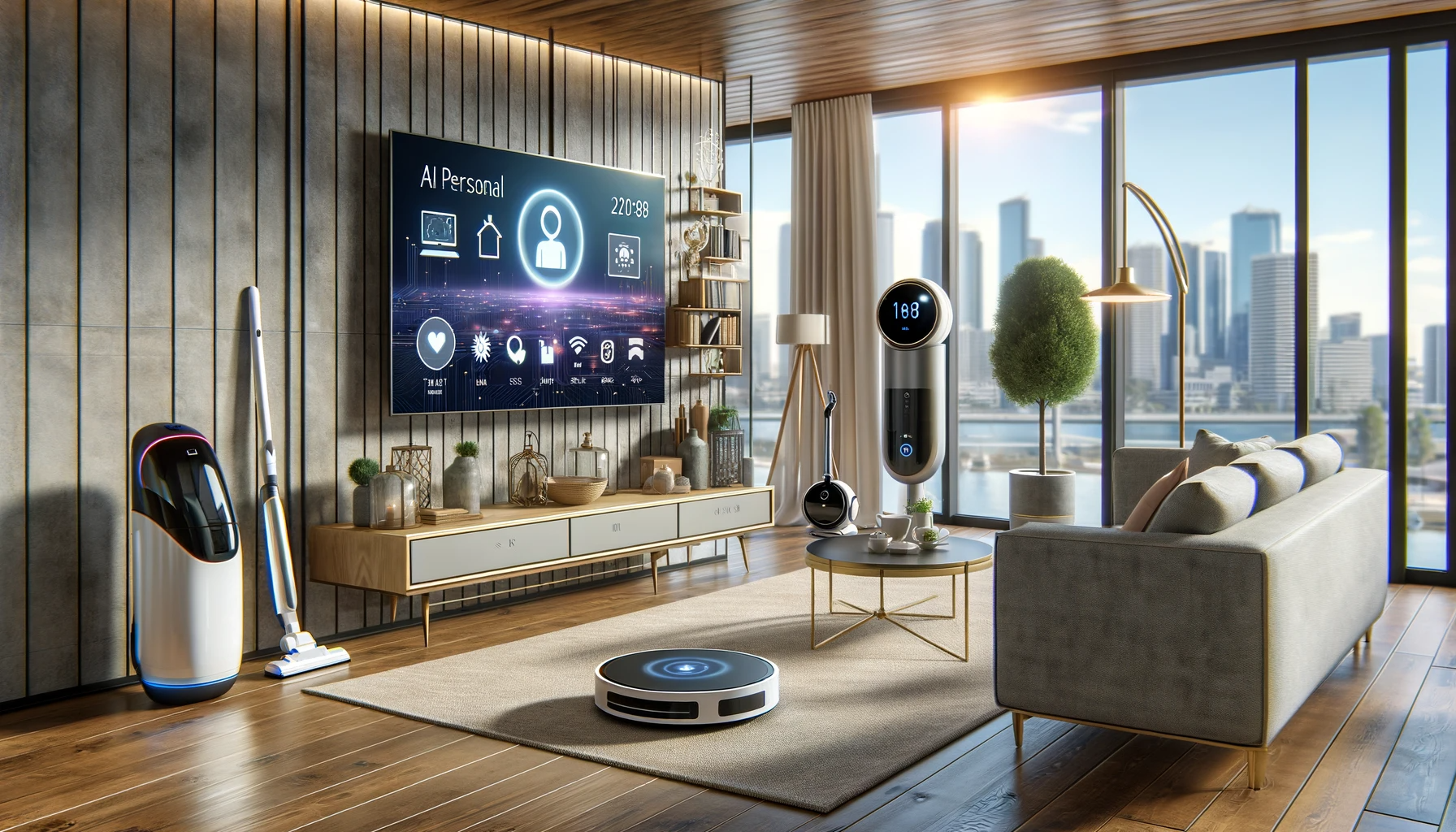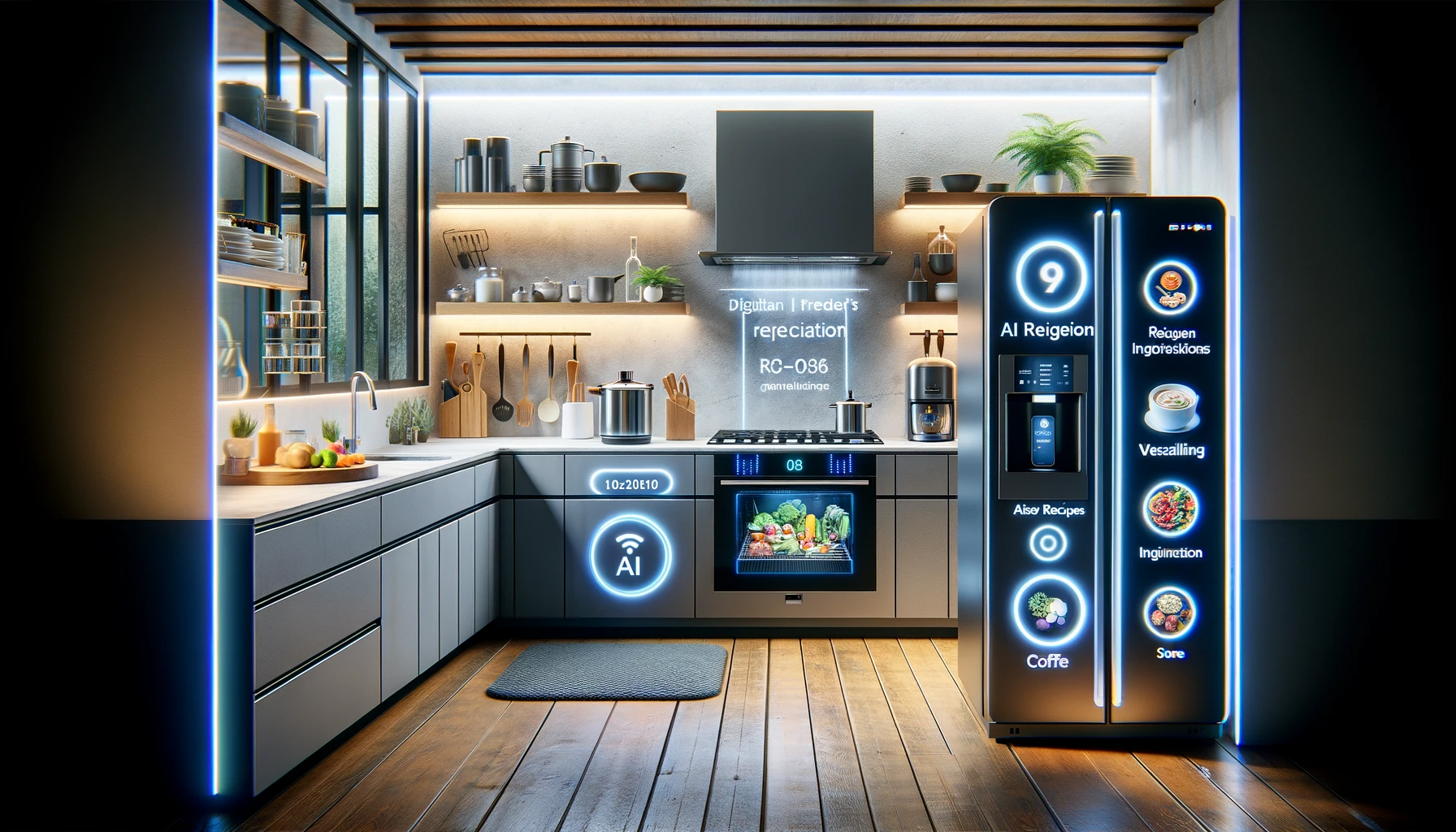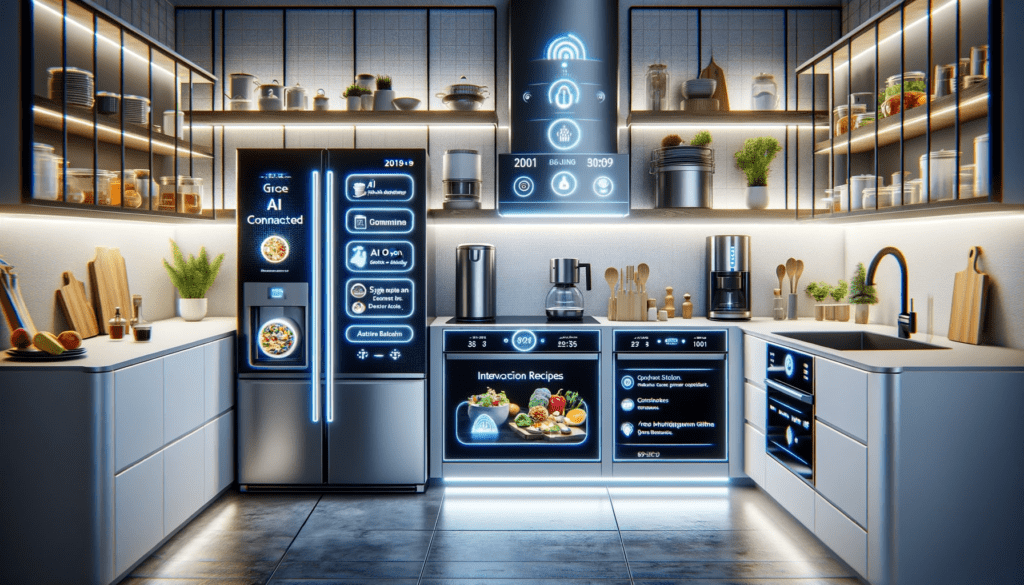The Fusion of AI and Smart Appliances
In today’s digital age, our homes are becoming smarter by the day. From voice-activated assistants like Amazon’s Alexa to refrigerators that can suggest recipes, technology is transforming our living spaces. At the heart of this transformation lies Artificial Intelligence (AI). AI is no longer just a buzzword; it’s the driving force behind the future of connected and smart appliances. In this extensive exploration, we delve into the world of AI-powered smart appliances, discovering how they are reshaping our daily lives and homes.
The Evolution of Home Appliances
Home appliances have come a long way since the invention of the electric vacuum cleaner in the early 20th century. Over the years, we’ve witnessed a remarkable transformation in our appliances. From basic functionalities to advanced features, appliances have adapted to our changing needs. However, the real game-changer arrived when AI stepped into the scene.
AI and Smart Appliances: A Symbiotic Relationship
The marriage of AI and smart appliances has given rise to a new era of convenience and efficiency. AI-powered devices are designed to understand and cater to our preferences, making our daily routines smoother and more enjoyable. Here’s how AI is reshaping the landscape of connected and smart appliances:
Enhanced User Experience
Imagine a refrigerator that keeps track of your groceries, suggests recipes based on the ingredients available, and even places an online order for items you’re running low on. AI makes this possible by learning your consumption patterns and offering personalized recommendations. It’s like having a culinary assistant right in your kitchen.
Energy Efficiency and Sustainability
AI doesn’t just make your life more convenient; it also contributes to a greener planet. Smart appliances equipped with AI can optimize energy consumption. For instance, your AI-powered thermostat learns your temperature preferences and schedules, adjusting heating and cooling to minimize energy wastage. This not only reduces your carbon footprint but also lowers your utility bills.
Intelligent Home Security
AI-driven security systems are becoming increasingly popular in smart homes. These systems can distinguish between intruders and harmless movements, reducing false alarms. They can also send real-time alerts to your smartphone, allowing you to monitor your home’s security remotely. The result? A safer and more secure living environment.
Personalized Health and Wellness
Smart appliances are also venturing into the realm of health and wellness. AI-powered fitness equipment can create customized workout plans, monitor your progress, and even provide real-time feedback on your form. Similarly, AI-integrated health devices can track your vital signs, offering insights into your well-being.
Voice Activation and Control
AI’s integration with voice recognition technology has revolutionized the way we interact with appliances. Voice-activated assistants like Amazon’s Alexa, Google Assistant, and Apple’s Siri allow you to control your appliances with simple voice commands. You can adjust lighting, play music, set timers, and even ask for recipes—all hands-free.
The Future of Connected and Smart Appliances
The future of connected and smart appliances appears promising. As AI continues to evolve, we can expect even more innovative features and functionalities. Imagine a coffee maker that brews your favorite blend as soon as it senses you waking up, or a washing machine that selects the perfect wash cycle for your laundry based on fabric types and stains. These are not distant fantasies; they are the potential realities of tomorrow’s smart homes.
Challenges and Considerations
While AI-powered smart appliances offer numerous advantages, they also present challenges and considerations. Here are some key factors to keep in mind:
Privacy Concerns
AI appliances often collect and process data to deliver personalized experiences. This raises concerns about data privacy and security. It’s essential to choose appliances from reputable manufacturers that prioritize user data protection.
Integration and Compatibility
To build a truly smart home, all your devices need to communicate seamlessly. Ensuring that your AI-powered appliances are compatible with each other and your chosen smart home ecosystem is crucial. Otherwise, you might end up with a disconnected jumble of gadgets.
Cost and Accessibility
AI-enabled appliances tend to be pricier than their traditional counterparts. While the prices are gradually coming down, cost remains a barrier for some consumers. Additionally, the accessibility of these appliances in certain regions and markets can be limited.
Learning Curve
For some users, adapting to AI-powered appliances may require a learning curve. Understanding how to set up and use these devices to their full potential can take time, and not everyone may be tech-savvy.

The Verdict: AI’s Essential Role in the Future of Smart Appliances
As we look ahead, it’s clear that AI is not just a trendy addition to smart appliances; it’s their central nervous system. The convenience, energy efficiency, and personalization AI brings to our homes are transformative. Smart appliances have transitioned from being mere machines to intelligent companions that cater to our needs and preferences.
While challenges exist, they are far outweighed by the benefits. As technology continues to advance and AI becomes more integrated into our daily lives, the future of connected and smart appliances appears boundless. From enhancing user experiences to promoting sustainability and security, AI is the key to unlocking the full potential of our homes.
In conclusion, the synergy between AI and smart appliances is not just enhancing our daily lives; it’s redefining our concept of home. With AI’s essential role, our homes are becoming more intuitive, efficient, and tailored to our individual needs. The future of connected and smart appliances is AI-powered, and it promises a brighter, more convenient, and sustainable way of living.
Real-World Examples of AI-Driven Smart Appliances
To truly understand the transformative power of AI in smart appliances, let’s delve into some real-world examples that demonstrate how these devices are reshaping our daily lives:
- Smart Thermostats: Companies like Nest (now a part of Google) offer smart thermostats that learn your heating and cooling preferences. Over time, they create energy-efficient schedules, adjusting the temperature to maximize comfort while minimizing energy consumption. This not only saves you money but also reduces your carbon footprint.
- Voice-Activated Assistants: Devices like Amazon Echo and Google Home have become central hubs for smart homes. You can use voice commands to control lights, thermostats, music playback, and even order groceries online. These voice-activated assistants are AI-powered and continuously improve their understanding of natural language.
- Smart Refrigerators: Samsung’s Family Hub refrigerator is a prime example of how AI is enhancing refrigeration. It features a large touchscreen that can display recipes, stream music, and even show the contents of your fridge with internal cameras. The AI helps you manage groceries, suggest recipes based on available ingredients, and even order items online.
- AI-Powered Vacuum Cleaners: Robotic vacuum cleaners like the Roomba from iRobot use AI algorithms to navigate your home efficiently. They can map your floor plan, remember areas they’ve already cleaned, and adapt to different floor surfaces. Some models can even be controlled via smartphone apps.
- Smart Ovens: Companies like June have developed smart ovens equipped with cameras and AI. These ovens can recognize the type of food you’re cooking and suggest optimal cooking settings. They can also be controlled remotely through a mobile app.
- Health and Wellness Devices: Devices like Fitbit and Apple Watch incorporate AI to provide insights into your health and fitness. They track your steps, heart rate, sleep patterns, and even offer guided workouts. The AI algorithms analyze the data to provide personalized recommendations for a healthier lifestyle.
- Security Systems: AI-powered security cameras and doorbell cameras are becoming commonplace in smart homes. They can distinguish between humans, animals, and objects, reducing false alerts. Some systems offer facial recognition, notifying you when familiar faces are detected, or alerting you to unfamiliar visitors.
- Smart Washing Machines: AI-enabled washing machines can detect the type of fabric and stains on your clothes, selecting the most suitable wash cycle. Some models can also notify you when it’s time to clean the lint filter or perform maintenance.
- AI in the Kitchen: Kitchen appliances like AI-driven coffee makers can learn your coffee preferences and brew your favorite blend as soon as you wake up. AI can also assist in meal preparation by suggesting recipes based on the ingredients you have on hand.
- AI-Powered Lighting: Smart lighting systems, such as Philips Hue, use AI to create personalized lighting schemes. You can adjust the color temperature and intensity to suit your mood or activities. Some systems can even sync with your daily routine, gradually dimming the lights in the evening to promote better sleep.
These real-world examples illustrate the diverse ways in which AI is integrated into our everyday appliances. From energy savings to convenience and personalization, AI is the driving force behind the evolution of smart appliances.
The Promise of a Smarter Future
As we continue our journey into the world of AI-powered smart appliances, it’s evident that the future holds even more exciting possibilities. We can expect further integration of AI with appliances, resulting in seamless connectivity, improved energy efficiency, and enhanced user experiences.
Imagine a future where your home anticipates your needs and preferences, making life more convenient and efficient. Whether it’s your morning coffee ready before you wake up, a fridge that prevents food waste, or a home security system that understands your routines, AI is set to make our homes smarter than ever.
AI and Energy Efficiency
One of the most significant advantages of AI in smart appliances is its ability to optimize energy consumption. Traditional appliances often operate on fixed schedules or settings, regardless of whether anyone is using them. In contrast, AI-driven appliances can adapt and make real-time adjustments based on user behavior and external conditions, leading to substantial energy savings.
Here’s how AI enhances energy efficiency:
- Adaptive Learning: AI-powered appliances, such as thermostats, can learn your daily routines and temperature preferences. For example, they can anticipate when you’ll be home and adjust the temperature accordingly. Over time, this adaptive learning can lead to significant reductions in energy consumption.
- Energy Usage Insights: Smart appliances equipped with AI provide users with detailed insights into their energy consumption patterns. You can track which devices consume the most energy and make informed decisions to reduce waste.
- Optimized Settings: AI algorithms can fine-tune appliance settings for maximum efficiency. Smart lighting systems, for instance, can adjust brightness and color temperature based on the time of day or your activities, reducing unnecessary energy use.
- Remote Control: With AI, you can control your appliances remotely through smartphone apps. Forgot to turn off the lights when leaving home? Simply use your phone to switch them off. This feature prevents unnecessary energy use and helps you save on utility bills.
- Integration with Renewable Energy: AI can integrate with renewable energy sources like solar panels and wind turbines. Smart appliances can prioritize using clean energy when it’s available, further reducing reliance on fossil fuels.
- Load Management: In a connected home, AI can manage the load on your electrical grid. For example, during peak demand periods, your AI-powered appliances can reduce their energy consumption to prevent grid overload, contributing to grid stability.
Environmental Benefits
The environmental impact of AI-driven smart appliances extends beyond energy efficiency:
- Reduced Carbon Footprint: By optimizing energy consumption and promoting the use of clean energy sources, AI-powered appliances contribute to a lower carbon footprint. This aligns with global efforts to combat climate change and reduce greenhouse gas emissions.
- Resource Conservation: Smart appliances equipped with AI can help conserve resources such as water. AI-driven washing machines, for example, can adjust water usage based on the size of the load and fabric type, reducing water waste.
- Waste Reduction: AI can play a role in reducing food waste by monitoring the contents of your refrigerator, alerting you to items nearing their expiration date, and suggesting recipes to use them up.
- Extended Appliance Lifespan: AI can also help extend the lifespan of appliances by providing maintenance alerts and troubleshooting tips. This reduces the frequency of appliance replacements, reducing electronic waste.
In essence, AI-driven smart appliances are pivotal in advancing energy efficiency and sustainability in our homes. As these technologies become more widespread, they will contribute significantly to reducing energy consumption and minimizing our ecological footprint.
Challenges and Considerations
While the integration of AI in smart appliances offers numerous benefits, there are challenges and considerations to be aware of:
- Privacy and Data Security: AI-powered appliances collect data to improve their functionality. Users must be cautious about data privacy and ensure that their devices have robust security measures in place.
- Compatibility: Integrating various smart appliances from different manufacturers can be challenging. Ensuring compatibility and seamless communication among devices may require careful planning.
- Initial Costs: Smart appliances often come at a premium compared to their traditional counterparts. However, the potential long-term savings in energy costs and resource conservation can offset these initial expenses.
- Dependency on Technology: As we rely more on AI for everyday tasks, there’s a risk of becoming overly dependent on technology. Maintaining a balance between convenience and self-sufficiency is essential.
 Conclusion
Conclusion
The integration of AI in smart appliances is transforming the way we interact with our homes. These innovative devices are enhancing convenience, energy efficiency, and user experiences while also contributing to sustainability and resource conservation. As AI continues to advance, smart appliances are becoming more intelligent and capable, offering a glimpse into the future of connected living.
From AI-powered voice assistants that can control multiple devices with a simple command to refrigerators that can suggest recipes based on available ingredients, the possibilities are expanding rapidly. AI’s adaptive learning capabilities, real-time adjustments, and data-driven insights are reshaping our daily routines and helping us lead more efficient and sustainable lives.
Furthermore, the environmental benefits of AI-driven smart appliances are significant. They not only reduce energy consumption but also help lower carbon emissions, conserve resources, and minimize waste. These contributions align with global efforts to address climate change and create a more sustainable future.
However, as we embrace this era of smart living, it’s crucial to address privacy and data security concerns, ensure device compatibility, and manage the initial costs associated with adopting these technologies. Striking a balance between the convenience AI offers and maintaining a level of self-sufficiency is essential.
In conclusion, AI is undeniably the key to unlocking the full potential of connected and smart appliances. As these technologies become more accessible and affordable, our homes will continue to evolve into intelligent living spaces that adapt to our needs, preferences, and environmental priorities. The future of connected living is bright, and AI is leading the way.
